#Bourg-Madame
Text
On Anne-Marie Robinot, Saint-Just's mother
What follows is a personal translation I did of an excerpt taken from the historian Stefania Di Pasquale's book Storie di Madri (A History of mothers) which includes a chapter on Louis-Antoine's mother. The notes at the end are included in the original work.
Marie-Anne Robinot was born in Décize on the 16th of January 1734, the daughter of Jeanne Philiberte Houdry (1712-1745) and Léonard Robinot (1701-1776), king’s counsel, royal notary and procurator in the bourg of Décize.
There are no contemporary pictures of this woman, but that doesn’t mean she was less important than others; the lack of any representation is probably due to the centuries that have passed since her death and to the destruction of personal belongings which occurred right after Robespierre’s fall and also, in particular, during the Restoration of the old European monarchies starting with the Congress of Vienna of 1815.
We don’t know much about her early years, except that she grew up among the Décize haute bourgeoisie of the 18th century and that she received a good education.
The French historian Ernest Hamel, who had met Saint-Just’s nephews for his grandfather was an intimate of the latter, wrote the following in his biography Histoire de Saint-Just: «Madame de Saint-Just was a charming and charitable woman, who outlived her son by a few years, she was sad by nature; she had loved with excessive love this predestined son, who until the last day returned her motherly tenderness with filial adoration. » (1)
Marie-Anne was a very religious woman, attached to her family, but compared to her contemporaries, who submitted to paternal will on certain matters such as those concerning arranged marriages, and, although she loved and respected her father, she believed it was unfair that parents could decide the future of their children, especially when they were already sentimentally attached to another person. This is what eventually happened to Marie-Anne.
Mademoiselle Robinot fell in love with Monsieur Louis-Jean Saint-Just de Richebourg, knight of the royal and military order of Saint-Louis, marshal of the gendarme company under the title of Berry, son of Marie-Françoise Adam and Charles de Saint-Just.
The age gap between the two was of twenty years: he, a mature man, and she, a young thirty years old woman still unmarried.
Marie-Anne had already the occasion to show her obstinacy just a couple of months after meeting captain Saint-Just.
Unfortunately their union would have been opposed by her father, who didn’t approve their relationship since he considered Louis-Jean as a simple peasant son of humble origins. Monsieur Robinot didn’t consider his future brother-in-law equal to his rank. But perhaps was it just an excuse? At the time the Robinot family was composed of men only and a female figure, who knew how to handle domestic servants, was much needed. The young woman wasn’t evidently of the same opinion and, on the suggestion of some notary friends of her, she resorted to the only means available at the time to counter paternal authority: les sommations respectueuses.
During the Ancien Régime the law required the father’s consent to celebrate a marriage, but in case it was denied, people over 25 could counter the refusal through a process called sommations respectueuses. To accomplish that, one had to rely on a notary and ask the family members three times for the written consent. After that, if the request kept being denied, the person could still proceed with the marriage.
Determined to fulfill her dream, Marie-Anne took courage against her paternal authority and on 21 March 1766 she appeared before her father together with notary Grenot and two other witnesses both belonging to the nobility.
Outraged by such audacity, Léonard Robinot pretended to be absent. The same occurred on 22 March. The following day, the 23, the day of the last visit, Robinot left the house defeated, without uttering a single word. Happy and contented, the next day Marie-Anne signed the marriage contract and the ceremony was set for 30 May 1766.
The two married in Verneuil with a quick ritual, celebrated by the uncle of the spouse, Antoine Robinot, and among the wedding witnesses there were a carpenter, a merchant and a cabaret comedian (two of them couldn’t either read or write).
In a rage, the rest of the Robinot Family didn’t even want to go out of their house to see the spouses, especially the disobedient daughter. Surely the intimacy of the ceremony was thought necessary to avoid their reprimand.
Marie-Anne got pregnant a few months after the marriage and on the 25th of August 1767 a child was born, who one day would have made history, who would have fought and died for the freedom of his country.
The chosen name was that of Louis-Antoine, Louis like his father and Antoine like his uncle and godfather, the abbot Antoine Robinot.
The little Saint-Just was baptized the same day he was born in the church of Saint-Aré (Décize) and, according to the customs of the time, he was placed in the care of a wet nurse in Verneuil who lived in a house next to his uncle's. A few years later his sisters were born as well: Loise-Marie-Antoine in 1768 and Marie-Françoise-Victoire in 1769.
In 1771, however, Antoine Robinot died, the Saint-Just family was forced to take their son back and move to Nampcel, to the house which once belonged to Charles de Saint-Just (1676-1766), Anoine’s paternal grandfather. Marie Madeleine, sister of Louis-Jean, was there to welcome them.
They lived together peacefully for some time, then the family moved again to Marie-Anne’s paternal household in Décize.
According to the French historian Bernard Vinot, Léonard Robinot was a good grandfather, who doted on little Louis-Antoine. However the joy of that peaceful life was short-lived.
In 1776 Robinot died and the Saint-Just family moved one last time to the rural village of Blérancourt. It was a graceful and tranquil place. There, thanks to his military merits, Louis-Jean obtained consideration and privileges, usually reserved to the lower nobility.
Léonhard’s inheritance was split among his children and on 18 July 1776 the heirs sold the house in Décize to Claude Leblanc: that was the last time one could find the Saint-Just spouses’ signature in the town of Décize.
And so Louis-Antoine left in July 1776 the place where he had spent the first four years of his life forever, but he would have never forgotten the mountains and the river Loire, from where the fairies and myths of his work Organt would have come out. (2)
[...] Unfortunately a large part of the familial correspondence [between Saint-Just and his family] was destroyed both during the persecutions the family endured after the death by decapitation of Louis-Antoine and after the dreadful Restauration which started with the Congress of Vienna of 1815.
[...] Other than the pain caused by the death of her beloved son, Madame Saint-Just had to endure the humiliations of the Directory political police.
A mother who until the very end kept like relics those few belongings of her son, saving them from the thermidorian fury; today one can see those mementos in a display case placed in Saint-Just’s house, now a museum, in Blérancourt. In these cases it’s possible to admire a book of the young revolutionary man still with the violet he had put inside as a bookmark; a bronze plaque with an angel on it (once it used to be in Louis-Antoine’s bedroom) and a quill. That was all the poor mother could save, since even the young man’s clothes had been sold to the authorities.
Marie-Anne didn’t even have a grave to mourn her son, buried without clothes to prevent someone from reclaiming those tortured bodies. For Louis-Antoine’s remains were thrown into a mass grave in the Parisian Errancis cemetery, close to Parc Monceau.
Today this cemetery doesn’t exist anymore and the 119 human remains were moved to the catacombs in Paris.
From a missive by Madame Saint-Just sent to the prefecture of the Aisne Department, we know that the authorities still refused to give her back some of the belongings, despite the fact that fifteen years had passed since her son’s death:
To the Prefect of the Department of Aisne, member of the Legion of Honour.
Marie-Anne Robinot, widow of the defunct Monsieur Louis de Saint-Just, former cavalry captain in Blérancourt and currently residing there, has the honour to notify you that, following the event of 9 Thermidor Year II, a commission named through a decree of the District of Chauny came to my house to seize all property titles belonging to me and my children, because of the sentence pronounced against Louis de Saint-Just, my son, representative in the National Convention; and that, as a consequence of that event another decree was released that allowed the return of the belongings to the parents of the convicts; I am in need of the titles of which I am concerned and which are currently deposited in the Archives of the prefecture of Aisne, I want to have the honour to ask the Prefect to be so kind to order the collection and delivery of my belongings through you; by doing so you shall have my most sincere gratitude and respect, Monsieur le Préfet,
your humble and obedient servant.
Widow Saint-Just.
Presented on 18 February 1809.
[...] After the death of her son and with age advancing, on 5 June 1807, Marie-Anne decided to make a will, leaving everything to her two daughters:
To Louise, I leave a house, with a kitchen with a small cellar, an attic, a tool shed, gardens for 21 hectares with fruit trees, everything located in Blérancourt in Rue de la Chouette.
To Victoire, a house with two rooms, a cellar, a hallway, an attic and office rooms, everything in Blérancourt in Rue de la Chouette. (3)
Madame Saint-Just died of a cholera epidemic four years after writing this small testament on 11 February 1811 in her house in Blérancourt, leaving the void and mourning of her daughters and nephews.
(1) Ernest Hamel, Histoire de Saint-Just, Paris, Poulet-Mallasis et de Braise, 1859, p. 26.
(2) In May 1789 in Paris L’Organt was published, it’s a poem divided into twenty chants in which Saint-Just criticized the absolute monarchy and clerical hierarchies.
(3) Claire Cioti, Saint-Just, cit.
#marie anne robinot#louis antoine saint just#antoine saint just#saint just#frev#french revolution#my translations
77 notes
·
View notes
Text
Holiday Audio/Video Gifts!
For the holiday season, here are some audio gifts from various shows and one Phantom video! The link to them is here and the info is below the cut:
Happy holidays and I hope you are all having time for some rest!
Audios
POTO
Jon Robyns, Paige Blankson, Joe Griffiths-Brown, Kelly Glyptis, Matt Harrop, Adam Linstead, Francesca Ellis, David Kristopher Brown, Maiya Hikasa
August 22, 2023; London
Tim Howar, Harriet Jones, Nadim Naaman, Lara Martins, Nicholas Garrett, Arvid Larsen, John Ellis, Valerie Cutko, Kelsi Boyden
March 19, 2023; Greece
Josh Piterman, Corinne Cowling (u/s), Danny Whitehead, Katy Hanna (u/s), Ross Dawes, Kris Manuel (u/s), Sophie Caton (u/s), Paul Ettore Tabone, Georgia Ware
October 17, 2019; London
Matinee.
Jeremy Stolle (u/s), Samantha Hill, Greg Mills (u/s), Michele McConnell, Richard Poole (u/s), Tim Jerome, Ellen Harvey, Christian Sebek, Kara Klein, Scott Mikita (u/s)
March 9, 2013; Broadway
Matinee performance.
John Owen-Jones, Deborah Dutcher, Matthew Cammelle, Bruce Montague, Charles Shirvell, Margaret Mary Kane (u/s), Janet Murphy, Jeremy Secomb, Lucy Middleton
January 5, 2002; London
Love Never Dies
Tam Mutu, Celia Graham, David Thaxton, Daniel Dowling
August 25, 2011; London
Tam Mutu's last performance.
Les Miserables
Christopher Jacobsen (u/s Jean Valjean), Stewart Clarke (Javert), Katie Hall (Fantine), Will Callan (Marius), Lulu-Mae Pears (Cosette), Amena El-Kindy (Eponine), Luke Kempner (Thenardier), Claire Machin (Madame Thenardier), Dejan Van der Flyert (Enjolras), Alex Shaw (Gavroche), Clohe Sullivan (Little Cosette), Tom Hext (Grantaire/Majordomo), Adam Pearce (Bishop/Claquesous), Ellie Ann Lowe (Factory Girl), Jordan Simon Pollard (u/s Foreman/Bujon), Matt Dempsey (Bamatabopis/Lesgles), Annabelle Aquino, Hazel Baldwin, Emily Olive Boyd, Ben Culleton, Matt Hayden, Sam Kipling, Anouk Van Lake, Harry Lake, Ben Oatley, Jonathan Stevens, Phoebe Williams, Ollie Wray
September 28, 2023; London
15,000th show in London and the 5th show for the new company.
Sunset Boulevard
Nicole Scherzinger (Norma), Tom Francis (Joe Gillis), David Thaxton (Max von Mayerling), Grace Hodgett Young (Betty Shaefer), Ahmed Hamaad (Artie), Tyler Davis (Sheldrake), Charlotte Jaconelli (Johanna), Jon Tsouras (Cecil B. de Mille)
September 28, 2023; London
Rebecca
Laureen Jones (I), Richard Carson (Maxim de Winter), Kara Lane (Mrs Danvers), Sara Harlington (Beatrice), Neil Moor (Giles), Piers Bate (Frank Crewley), David Breeds (Ben), Alex James Ward (Jack Favell), Shrley Jameson (Mrs Van Hopper), Nicholas Lumley (Colonel Julian)
September 27, 2023; Off-West End
POTO Video
Ian Jon Bourg, Olivia Safe (u/s), Kyle Gonyea
2001; Hamburg, Germany
VOB files. One of the most legendary Phantom's opposite one of the youngest Christine's!
#as always if any have to be removed do let me know!#audio gift#video gift#phantom of the opera#the phantom of the opera#les miserables#love never dies#rebecca#sunset boulevard#jon robyns#paige blankson#nicole scherzinger#ian jon bourg#kara lane#richard carson#christopher jacobsen#stewart clarke#katie hall#tam mutu#celia graham#tim howar#harriet jones#nadim naaman#jeremy stolle#samantha hill#greg mills#josh piterman#corinne cowling#danny whitehead
118 notes
·
View notes
Text
Susan Owen audio gifting!
Since the lovely Susan Owen won my underrated christine poll here’s some audios of her!
Lawrence Anderson (u/s The Phantom of the Opera), Susan Owen (alt Christine Daaé), Robert Vernon (u/s Raoul, Vicomte de Chagny), Liz McCartney (Carlotta Giudicelli), Donn Cook (Monsieur Firmin), Ian Jon Bourg (Monsieur André), Olga Talyn (Madame Giry), Mark Calkins (Ubaldo Piangi), Jennifer Dawn Stillings (Meg Giry) || August 30, 1997; Second National Tour
https://www.mediafire.com/file/jv8ua2lb0ccdq81/The+Phantom+of+the+Opera+2NT+Washington+D.C.+1997+August+30.zip/file
Howard McGillin (The Phantom of the Opera), Susan Owen (u/s Christine Daaé), Carrington Vilmont (u/s Raoul, Vicomte de Chagny), Patricia Phillips (Carlotta Giudicelli), Jeff Keller (Monsieur Firmin), George Lee Andrews (Monsieur André), Marilyn Caskey (Madame Giry), Larry Wayne Morbitt (Ubaldo Piangi), Heather McFadden (Meg Giry) || December 26, 2003; Broadway || Notes: Highlights, 73 minutes. From 'Prima Donna' to end of show. Only recording of Howard during his two-week return to the show. Second performance of Susan Owen on Broadway.
https://www.mediafire.com/file/upxclnvg37nmi2g/POTO+Broadway+2003-12-26+HM+SO+CV.zip/file
Hugh Panaro (The Phantom of the Opera), Susan Owen (alt Christine Daaé), Kyle Barisich (Raoul, Vicomte de Chagny) || February 20, 2012; Broadway
https://www.mediafire.com/file/b6fsdhxna6bf1rs/Phantom+-+Broadway+-+February+20+2012+HP+SO+KB.zip/file
25 notes
·
View notes
Note
I’ve seen on Tumblr that Camille wanted to marry Lucile’s mother, Annette Bosdeveix. Do you know what the source is for that and is there anything else we know about Camille and Annette’s relationship? Thank you!
We actually know quite a bit about the relationship between Camille and Annette. Not long ago, eight letters from the former to the latter written between the years 1784 - 1790 were published for everyone to read. I won’t translate them in their entirety here though, both because I think this would get way too long if I did, and because I sometimes honestly can’t fully make out what Camille is trying to say.
Camille and Annette’s first meeting dates back to the spring 1783, when the former is a 23 year old law student and the latter a 32 year old mother of two, married since 15 years back. Camille first spots Annette walking in the Luxembourg garden with her daughters, Lucile (13 years old) and Adèle (9 years old). He describes this meeting in the following verse, dedicated to ”Mme D, who always goes for a walk with her two demoiselles” and published in the l’Almanach littéraire in 1784 and the Affiches du Beauvaisis in 1785:
Everyone stops and says: ”how beautiful she is!”
As for me, I’ve never seen her.
But that doesn’t stop me from asking: ”is she a goddess or a mortal?”
How can I hold myself back, seeing so many attractions,
And two doves following her.
(Chacun s’arrête, et se dit, ”qu’elle est belle!”
Pour moi, je ne la vis jamais .
Sans demander: est-elle ou déesse ou mortelle?
Pouvais-je m’y réprendre, en voyant tant d’attraits,
Et deux colombes auprès d’elle.)
Camille eventually approaches Annette and the two start talking about poetry and Camille’s literary projets. Annette consults him to meet one M. Neveu, and even fixes and interview between the two. From a letter Camille writes her on July 10 1784 (the first of those recently published) we do however learn that he wants their relationship to go deeper than that:
It was doing you justice to believe that a musician presented to me by your hand could not fail to be preferred to all the ini [sic]. […]My job was to get acquainted with Madame Duplessis, and instead of taking me into her apartment, I was taken to the house of a musician. You will agree, Madame, that this is perfidy. Besides, it is up to you that tomorrow my work will be in the hands of Mr. Neveu, and since it costs you so little to procure it for him, if this little costs you still too much, I will see that you want me to renounce for ever sweeter hopes, and I will confine myself to admiring you from afar in the alleys of the Luxembourg.
The letter does however also make it clear that Camille only sees their relationship as platonic:
That among the authors, you choose the one whose poetry dates only from your walks in the Luxembourg and the day he saw you there, it is a very natural thing and I do not understand your excessive delicacy towards a young man who, for fifteen months, has given you such multiplied proofs that platonic love is not a chimera.
So no, the idea that Camille sought to marry Lucile’s mother would appear to be false. It can also be added that Annette wasn’t the only woman he wrote love verses to around this period, evidently a big interest of his. To a lady present for the divorce trial of one Maître Gerbier, Camille adressed the following verse:
De milles qualités nature te dota;
Sexe charmante, sexe si tendre;
Par un seul don le ciel nous consola.
Il nous fit les plus forts; ce bien ce qu’il nous laissa,
C’est le plaisir de te défendre.
In July 1783 he also assured one demoiselles de Compiègne that ”I owe the majority of verses I’ve written this year to you, it’s you who have inspired me.” The same year, the Journal de Paris published a poem he wrote for one Mme de Courve, and the year after that Camille published a similar verse adressed to Mme de La Lande in l’Almanach littéraire.
In 1786 Camille, sad over Annette having parted for her country house at Bourg-la-Reine for the summer, wrote her the following verse:
Me voilà donc après trois ans
Toujours à la premiere page
Du plus ennuyeux des romans;
On m’eût fait languir moins longtemps
Si j’avais été plus volage.
Je le disais, et cependant,
Pour vous voir encore un instant
Je volais sur votre passage;
Et quand vous fuyiez de ces lieux
Les pleurs qui coulaient de mes yeux
Soutanient bien mal ce langage
Ce n’est point cette majesté
Et cette taille de déesse
Et cette grâce enchanteresse
Et ces beaux yeux, quand la tendresse
En adohcissait la fierté
Que je vais regretter sans cesse.
Mais que j’aime à vous voir sur le déclin du jour,
Sous un ombrage solitaire
À vos enfants souriant tour à tour
Insensible au charme de plaire,
Insensible aux plaisirs qu’offre l’amour,
Ne goûter que ceux d’être mère
Ah! Lorsque l’encens le plus duox
Sur la terrasse vous appelle,
Pourquoi vous éloigner de vingt cercles jaloux?
D[uplessis], est-ce, dites-nous,
Crainte d’alarmer un époux?
Est-ce honte d’être la plus belle ?
C’était ces regards si touchants,
Ce son de voux si doux, cette mélancolie,
Ces fleurs que vous jetait Julie;
C’était ces deux boutons naissants
Près d’une rose épanouie,
Qui m’ont conduit à vos genoux
Et m’auraient fait trouver si doux
De passer près de vous ma vie.
Il vous eût peu coûté de captiver mon cœur
Vous voir est plus que posséder une autre,
Et je pensais que faire mon bonheur
Ce serait ajouter au vôtre.
One year later he asked Annette and her husband Claude if one day, when his financial situation had improved, he could marry their oldest daughter, a request that was rejected. Camille did however not give up so easily, in March the same year he wrote a letter to Claude refuting all of his charges as to why the idea was a bad one. When that didn’t bear any fruit he instead tried to influence Annette, which gives us the following letter from December 5 1787:
[…] Judge if the noise of this carriage pleases me, when it warns me that you are driving your daughter into the world where she is going to find so many admirers. Thus will all my dreams vanish. Do I dare, however, Madame, to remind you of what you told me, that you would put no ambition in the choice of son-in-law, and that my profession seemed to you quite honest and quite noble. This is what inspired me with some confidence. Must you take away from me today a hope so dear to the attachment that I have nurtured for so many years to come out of my heart with hope! […] I beg you, Madame, do not read this letter to your husband, with whom I would still pass for a madman, it is to you that I am writing it, to you who do not return my letters to me and that I I never left, without leaving your presence, if not full of contentment, at least full of patience. Shall I not have the pleasure of conversing with you at least sometimes? […] I found verses printed and maimed in provincial notices which I had addressed to you; I take the liberty of sending them to you and of renewing my homage to you. Will you do nothing for your poet?
On March 4 1788 he once again writes to Annette to inform her about his first real success as a lawyer, hoping that might persuade her to hand over her daugther:
[…] Once you have read my memoir, and compared it with the feeble consultation of Me Fournel who nevertheless enjoys such a great reputation, I dare to imagiene, Madame, that you will forgive me for having also hoped for some consideration; and that you will forgive me for having nourished another much more cherished hope, remembering that M. Duplessis, a year before yesterday, did not even demand that I should become a famous lawyer in order to obtain Mademoiselle Duplessis. Now this hope is weakening every day, I see that everyone has the same eyes for your daughter as I do, it seems to that in every moment someone comes to ask for her hand. I am waiting for my justificatory memorandum which will finally fix my fate and make access to you either open or closed forever. The encouragement that has sustained me most in this work to which I have sacrificed all my business has been the hope of presenting it to you. Is it possible, Madame, that when the image of happiness that I find with you detaches me from all societies and makes them bland and unbearable, you never tire of pushing me away from yours, which would take the place of the whole universe?
But twelve days later we find another letter from Camille, where we learn that Annette had once again responded with disapproval and even asked him to stop vistiting her house:
What harm have I done you for you to treat me so harshly? And how could a letter which I wrote only to persuade you offend you and draw such a bitter response from me? I don't want it to be your fault if I conceived a mad passion, but don't we owe anything to those who are made to suffer even without our fault? Could you not make me understand in a less mortifying way, that there was madness in my pursuit, that the disproportion of fortunes (which I only knew about yesterday) was an insurmountable obstacle; you would have seemed to pity me, and I could not have complained of you, on the contrary, I would have thanked you for the care you took to prevent a disastrous passion, I would have believed myself well treated; for you know better than anyone that it takes very little to make me believe it. Sometimes you have really put my self-esteem to severe trials! One does not die of spite, if so I would have already have died a thousand times. But all it would take is a glance, half a smile, to bring me back. Even today, at this moment, all my self-love is incurable! I am trying to reconcile the harshness of what you have just written to me, with the very different speech that you gave me, and I am trying to interpret it favorably. It seems to me that the remedy you employ is either too violent or too little. It's up to you to make yourself lovable anywhere other than at my place. Is it just a defence? Or is it not also a permission? Forbidden to make myself friendly in your eyes at your place, permission to make myself friendly, if possible, in the Luxembourg. This is what it means to be a lawyer. […] This leads me to believe that your answer does not carry a permanent banishment, that was what you repeated for me in the Luxembourg, not at the moment, and besides, it's still a letter that I received from you, which is something. You see Madame that I am laughing and crying at the same time. Thank you, one more word from you. Or, treat me so harshly that you force me to hate you and even your demoiselles; or, if your feelings have not changed since the conversation I had the honor of obtaining from you in the Luxembourg, refuse me permission to come to your house now, so as to give me the hope of one day obtaining it.
After this, it would appear the two cut contacts for a while. In a letter dated October 27 1788 to his best friend from school Pierre Jean André Grasset, Camille spoke disapprovingly of the whole family, even accusing Annette of wanting to seduce him:
I always continued to chase the same hare, the mother lured me into the house, the father promised me his daughter, gave me his word of honour; the girl made me think she wanted me; a few days later came a terrible storm which threw me far from the door, farther than ever. […] I could not imagine that by courting the girl I had pleased the mother, and that she wanted to take a chance on me; I could not trust the rascal of a servant who went home to me to invite me to take lodgings in the apartment next to theirs, that the girl was flirtatious, that it was was the mother who liked me, that I would succeed. Today the scales have fallen from my eyes; but then I thought they wanted to test me, a new promise to give her to me, a new rupture.
Camille and Annette picked up contacts again in 1790, with Camille sometimes even being invited into the apartment again. Camille was once again hoping to be able to marry Lucile, and this time he started using the contacts he’d gained as a journalist to impress her parents. On April 15 he writes ”It was M. Linguet I showed you this morning through my window,” and two weeks later he told her that Mirabeau and Emmery were coming to visit their country house at Bourg-la-Reine together with him. Annette was however still hesitant, causing Camille to grow desperate:
(April 14 1790)
If you knew what trap has been laid for me, you would have compassion for me. I can clearly see that I am no happier in friendships than I am with love… It is not that I believed for a moment in calumnies; it is thus so, I said to myself, that they slandered me to Madame Duplessis, it is by these artifices that they closed their door to me. However, I was only asked to suspend my judgment, I was to have some clarification this morning for which I would be grateful. I went to look for it and saw only a gross conspiracy against my happiness. I don't know who to trust in the world anymore. Madame, you have sometimes shown interest in me, have pity on my situation; I no longer dare to come to your house, three times I have been refused entry, but deign to give me a moment's interview to unravel this riddle for you, and don't think that I could ever believe that Mademoiselle Lucile and M. Duplessis deceived me so cruelly. Virtue and sensibility have a physiognomy that art does not counterfeit. I distrust all men now, but something tells me that my trust would not be betrayed if I place it in you without reserve. […]This number which belonged to you, since you had it made for me in such a short time, you had the cruelty to send it back to me without wanting to read it.
(April 15 1790)
Your note would be an answer to my letter, if it was to alarm you that I had asked you for an interview. I read there this answer: of such kind as the calumnies of which you speak, they are so devoid of verisimilitude that it is impossible for them to shake my security, and yet it is useless to grant you the interview that you ask for. But, Madame, it was for me that I requested this interview. It is for me alone that I beg you to have compassion. After seven years of the most constant and most unfortunate passion, at least leave me the sweetness of thinking that the beauty I loved was worthy of being so idolized, that I only have myself to blame, and not nature, which has not made me the one who was to touch her heart. I can no longer be happy, but to be less miserable I need someone to convince me that I was not used as a toy... […] Madame, you have given me marks of interest which I oppose in the bottom of my heart to all these thoughts which sometimes arise there, according to which you amuse yourself by tormenting my life. Add this new brand of benevolence. Grant me an interview, I beg you. Despite all the harm you have done me, I believe that Mademoiselle Lucile's heart is modeled after yours; I think they are both excellent. You don't want to remember that day when you promised me the hand of your dear daughter, or when you assured me that you could dispose of her heart. Why did you promise me what was not in your power? For what? […] What have I done that could have made me be refused three times at your door? If only you knew how much these refusals humiliate me, drive me to despair. I felt terrible last Saturday night. I implore you, Madame, to at least grant me an extraordinary interview today.
(May 10 1790)
[…] Did you notice how Mademoiselle Lucile sent me away cruelly yesterday? But you must always admire her more and more and she must be allowed to have a little pride. I really hope that now at least, I have no more new talents to discover in her, if she has any that I still don't know about, please hide them from me. I kiss your hands; for Mademoiselle Lucile there is no way to kiss hers even with gloves on. However, Madame, you are so much loved. What hurt you yesterday has hurt your celestial Lucile so much that if you wanted to take my interests to heart, I would hope for everything. Forget what she forbade you.
But on December 11 Annette and Claude finally agreed to let Camille marry Lucile (I’ve not been able to discover he exact reasons for their change of heart), and as can be seen through the following letterCamille sent his father the same day, Annette was happy with the decision:
This charming Lucile, whom I have talked to you so much about, whom I have loved for the past eight years, at last her parents give her to me and she does not refuse me. Her mother just came to tell me the news, crying of joy. […] When her mother told me a moment ago, she brought me to her room; I threw myself on Lucile’s lap; surprised at hearing her laugh I open my eyes, hers were in no better state than mine, she was all in tears, she was even crying profusely and yet she was still laughing. I have never seen such a delightful spectacle, and I would not have imagined that nature and sensibility could unite these two contrasts to such an extent.
Eightteen days later Annette and the rest of the family attended the couple’s wedding.
After Camille had gotten his Lucile, no more letters from him to Annette are conserved. We do however know through several other pieces that they remained close afterwards regardless. After their marriage, Camille and Lucile moved to 1 Rue de Théatre Francais (today 22 Rue de l���Odéon), just a two minute walk from Lucile’s childhood home on 22 Rue de Condé. From the diary Lucile kept 1792-1793 we see that Annette was a frequent visitor to the house. Annette also got to know some of Camille’s collegues, such as Danton, who Lucile asks her to give her news about in a letter dated February 16 1792, Fréron, who nicknamed her Melpomène and came to visit their country house, and Robespierre, who she might have planned to marry off her second daughter to. When Annette’s husband was arrested as suspect in January 1794, Camille protested against it both at the Convention and in the Vieux Cordelier.
Once Camille himself was arrested, Annette was reportedly in despair. In his third and final prison letterto Lucile, Camille reports the following:
Last evening my heart broke when I saw your mother in the garden. A mechanical movement threw me on my knees against the bars; I clasped my hands as if imploring her pity, she who moans, I am sure of it, in your bosom. Yesterday I saw her pain, in her handkerchief and her veil which she lowered, unable to bear this spectacle. When you come, let her sit a little closer with you, so that I can see you better.
Camille thought about Annette too, in the same letter he reports about this dream he’s just had:
Heaven took pity on me. Only a moment ago, I saw you in a dream, I embraced you in turn, you, Horace and Daronne (nickname for Annette) who was at our house. […] Farewell Lucile, my Lucile! My dear Lucile! Farewell Horace, Annette, Adèle, farewell my father!
After the death of Camille and Lucile, Annette worked together with Camille’s old friends and collegues Brune, Duplain, Panis and Fréron to get back Camille and Lucile’s confiscated effects and make sure their son Horace, who she adopted, got a good education. She evidently didn’t blame Camille for her daughter’s death, as she in 1800, when writing to Lucien Bonaparte to ask for the disbursement of the pension for Horace, voted through four years earlier by the Conseil de Cinq-Cents, said that his father was ”Camille-Desmoulins, this hero of republican humanity.”
That it was a glorified image of his father Annette provided her grandson with is also proven through a letter Horace wrote in 1822 to the editor Barrière, claiming that his father had never written anything called l’Histoire des Brissotins, in reality a pamphlet essential in the purge of the girondins…
Sources for everything that doesn’t have a link to it: Camille et Lucile Desmoulins: un rêve de république (2019)
35 notes
·
View notes
Text
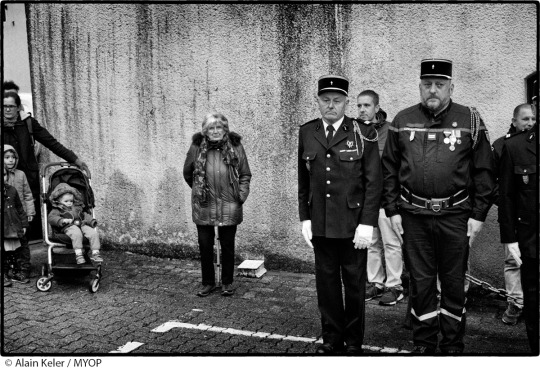
Journal d’un photographe/ Le bal des oubliées
Vendredi 25 Août 2023.
Comment choisir la Photo lorsqu’il en faut…dix sur des semaines de travail ! Pour le photographe que je suis, c’est un énorme dilemme que j’ai toujours du mal à assumer.
Je parle du projet de la BNF « Radioscopie de la France », projet pour lequel j’ai été choisi avec cent quatre-vingt-dix-neuf autres photographes. On parle déjà chiffres, mais dix photos quand même, ce n’est pas beaucoup. Ou peut-être beaucoup en fonction de la manière de travailler des photographes.
Alors dans ce journal estival, je suis allé à la recherche de ces photos non choisies, oubliées, par erreur ou-et mauvais choix de ma part, perturbé par le temps et le manque de recul sur le travail accompli. Il y a aussi les voisines, parfois aussi bien, sinon meilleures que la photo sortie gagnante. Les photos aiment jouer avec nous. Elles se cachent souvent pour réapparaître des années plus tard, lors de nouvelles recherches et une vision enrichie par l’expérience acquise.
Extrait de mon journal de bord.
Samedi 12 mars 2022.
Montaigut, fête la sainte Barbe des pompiers. Devant la mairie il y a quelques curieux qui attendent. Le Maire et la députée de Riom vont défiler en tête du cortège jusqu’à la salle des fêtes. La musique résonnera dans les petites rues étroites, comme pour réveiller ce petit bourg d’Auvergne.
Pourquoi cette petite ville ? Parce qu’elle était à côté de l’étang de Montmazot où j’allais enfant avec Madame Conchon, nounou sans être nounou. Elle faisait des ménages chez ma mère qui l’adorait. J’allais de temps en temps dans sa petite maison de Montmazot. Souvenirs d’une première enfance. Michel, son beau-fils m’emmenait à la chasse. Je me souviens aussi avoir assisté à des naissances de veaux chez des éleveurs du coin. Il y avait aussi des nids d’hirondelles dans un local à côté de la maison. Le samedi, nous faisions des copeaux de bois pour la piste de dance du restaurant voisin qui appartenait à des cousins. Les copeaux aidaient les danseurs à glisser sous les airs d’accordéon d’un orchestre de la région.
Avec Madame Conchon, nous allions de temps en temps à pied à Montaigut, à quatre kilomètres, faire quelques courses. Elle m’achetait « Tarzan », mon premier journal illustré.
"Cette photographie a été produite dans le cadre de la grande commande nationale "Radioscopie de la France : regards sur un pays traversé par la crise sanitaire" financée par le Ministère de la culture et pilotée par la BnF".
8 notes
·
View notes
Text
my love for you is infinite - part9
Santiago Garcia x afab!reader(Darcy)
note: pride and prejudice (2005) but with triple frontier boys because why not lol
word count: 1859
warnings: things are getting a lttle heated
you can also read it on ao3.
part8 - part10 - masterlist
Santiago's carriage arrives at a smallish but charming rectory in Kent. This is Hunsford, Charlotte's new home. She rushes out and greets Santiago, kissing his cheek nervously.
Mr. Collins bows and ushers him in.
“Welcome to our humble abode.” He starts and continues to talk but Charlotte cuts him.
“My dear, I think our guest is tired after his journey.”
“Ah, yes… My wife encourages me to spend as much time in the garden as possible, for the sake of my health.”
A beat. Santiago glances at Charlotte, who remains impassive.
“I plan many improvements, of course. I intend to throw out a bow and plant a lime walk. Oh yes, I flatter myself that any young lady would be happy to be the mistress of such a house.”
A tiny nod from Santiago. Charlotte takes his arm and starts to walk to another room.
They are at last alone. They sit down in a charming little parlor that faces the front of the house. Charlotte pours out tea.
“We shall not be disturbed here, this parlour is for my own particular use. Oh Santiago, it's such a pleasure, to run my own home!”
Santiago nods uncomfortably.
“Charlotte! Come here!” Mr. Collins yells.
Charlotte jumps up and rushes to the window.
“What's happened?” says Santiago, alarmed.
“Charlotte!”
“Has the pig escaped again?”
Outside in the lane, Mr. Collins stands, bowing: at a carriage.
“Oh! It's Lady Catherine. Come and see, Santiago!”
Santiago goes to the window, unnerved by his friend’s enthusiasm. Mr. Collins rushes back towards the house and talks to them through an open window.
“Great news! Great news! We have an invitation to visit Rosings this evening from Lady Catherine de Bourg.”
“How wonderful!”
Santiago tries to feign pleasure.
“Do not make yourself uneasy, my dear cousin, about your apparel.”
“Just put on whatever you've brought that's best.”
“Lady Catherine has never been averse to the truly humble.”
Santiago stares at them both in disbelief.
***
Santiago, Charlotte and Mr. Collins walk hurriedly across a bridge towards the great house. The grey building looms ominously above them. It is grand without being elegant.
“One of the most extraordinary sights in all Europe, is it not. The glazing alone cost upwards of twenty thousand pounds.” Mr. Collins bragged.
The salon at Rosings is spectacularly grand; hideously so. Heavy furniture, rows of servants. The three guests are shown in by the footman. Again, Mr. Collins scrapes the floor with his bow.
“Your Ladyship. Miss de Bourg.”
Lady Catherine ignores him.
“So, you are Santiago Garcia Bennet.
“I am, your ladyship.”
“Hmm. This is my daughter.”
“It' s very kind of you to ask us to dine, Lady Catherine.” Charlotte interferes.
Lady Catherine ignores her, too.
“The chimneypiece alone cost 400 pounds.” Mr. Collins whispers to Santiago.
But Santiago doesn't hear. Miss Darcy walks into the room. freezes. Another man is with him.
“Miss Darcy! What are you doing here?”
“Oh, Miss Darcy. I had no idea we would have the honour...”
A stiff bow from Darcy, who looks at Mr Collins as if he's something brought in by the dog. She turns to Santiago, trying to collect herself.
“Mr. Santiago... I'm a guest here.”
“You know my niece?” Lady Catherine says, not pleased.
“Yes, madam, I had the pleasure of meeting your niece in Hertfordshire.”
Fitzwilliam, a much more easy-going chap, introduces himself.
“Colonel Fitzwilliam. How do you do?”
He bows. Santiago returns his smile gratefully. They move towards the dining room. Mr. Collins leans towards Santiago.
“You know Miss Darcy is as good as engaged to Miss de Bourg?”
“Really? Caroline will be disappointed to hear that.” He looks at the girl, and whispers to Charlotte “What a miserable little thing! They should suit each other perfectly.”
But Charlotte's uneasy smile confirms to Santiago that she has lost his friend in more ways than one.
***
The dining room is laid for a very grand dinner - footmen waiting, thousands of candles. Lady Catherine seats herself at the he and of the table.
“Mr. Collins! You can't sit next to your wife, get up. Move over there.”
After an awkward shuffle, Santiago finds himself sitting next to Darcy. Only his own discomfort prevents him from noticing Darcy is by no means master of her responses.
“I trust your family is in good health, Mr. Santiago?”
“They are, thank you. My eldest brother is currently in London, perhaps you happened to see him there?”
“I haven't been fortunate enough, no.”
Santiago looks at her. She colors slightly. Lady Catherine addresses Santiago in a loud voice, from the head of the table.
“Do you play the pianoforte, Mr. Bennet?”
“A little, ma'am, and very poorly.”
“Oh. Do you draw?”
“No, not at all.”
“Your siblings, do they draw?”
“Not one.”
“Has your governess left you?”
“We never had a governess.”
Mr. Collins squirms in embarrassment. Darcy watches Santiago, keenly.
“No governess? Five siblings brought up at home without a governess, I never heard such a thing! Your mother must have been quite a slave to your education.”
“Not at all, Lady Catherine.”
“Mmmm. Are any of your younger brothers out in society?”
“Yes, ma'am. All.”
“All! What, five out at once? Very odd! And you only the second the younger ones out before the elders are married! Your youngest must be very young.”
“Yes, my youngest is not sixteen. But I think it would be very hard on younger brothers, not to have their share of amusement because the elder is still unmarried. And to be kept back on such a motive! It would hardly encourage brotherly affection.”
“Upon my word, you give your opinion very decidedly for so young a person. Pray, what is your age?”
“With three younger brothers grown up, your Ladyship can hardly expect me to own to it.”
Lady Catherine looks astonished. Mr. Collins shifts in his seat, Santiago's enjoying himself and Darcy's having great difficulty concealing her admiration.
***
Dinner is over and they are drinking coffee. Darcy moves towards Santiago but Lady Catherine interrupts, by shouting from her seat.
“Come, Miss Bennet, and play for us!”
“No, I beg you-”
“Music is my delight. In fact, there are few people in England who have more true enjoyment of music than myself, or better natural taste. If I had ever learnt, I should have been a prodigy. So would Anne, if her health would have allowed her.”
“Lady Catherine, I am not afflicted with false modesty and when I say I play poorly ...”
“Come come, Santiago, her ladyship demands it!” Mr. Collins insists.
Santiago reluctantly sits down at the piano and starts to play. Lady Catherine takes no notice and talks loudly over the music.
“How does Georgiana get along, Darcy?”
“She plays very well.”
“I hope she practices. No excellence can be acquired without constant practice. I have told Mrs. Collins this. (Turns to Charlotte) Though you have no instrument of your own you are very welcome to come to Rosings and play on the piano in the housekeeper's room.”
“Thank you, your ladyship.”
“You would be in nobody's way, you know, in that part of the house.”
Darcy flinches at her bad manners. He moves away to the piano where Santiago is playing - not that terribly well, it must be said. He's nervous, plays a wrong chord and then gets angry with himself and focusses.
“You mean to frighten me, Miss Darcy, by coming in all your state to hear me, but I won't be alarmed even though your sister does play so well.”
“I am well enough acquainted with you, Mr. Santiago, to know I cannot alarm you even should I wish it.”
A beat. They eye each other warily. Colonel Fitzwilliam joins them.
“What was my friend like, in Hertfordshire?”
“You really care to know?”
The colonel nods.
“Prepare yourself for something very dreadful. The first time I saw her, at the Assembly, she danced with nobody at all “
“I knew nobody beyond my own party.”
“True, and nobody can be introduced in a ballroom.”
“Fitzwilliam! I need you!” Lady Catherine calls.
He moves away. Darcy and Santiago are alone. Darcy's struggling with her pride which suddenly gives way.
“I do not have the talent of conversing easily with people I have never met before.”
“Perhaps you should take your aunt's advice and practice.”
Darcy flinches. Santiago turns away from her and carries on playing. Darcy gazes at the curve of his neck.
***
Santiago is writing a letter in the drawing room. He starts "Dear Francisco..." The doorbell rings in the background, he thinks nothing of it and continues. The maid opens the door to the drawing room and Miss Darcy enters.
“Miss Darcy!”
An awkward pause.
“Please, do be seated. I'm afraid Mr. and Mrs. Collins are gone on business to the village.”
A pause. What on earth does Miss Darcy want? She paces up and down.
“This is a charming house. I believe my aunt did a great deal to it when Mr. Collins first arrived.”
“I believe so - and she could not have bestowed her kindness on a more grateful subject.”
Another pause.
“Mr. Collins seems very fortunate in his choice of wife.”
“He is indeed lucky to have found one of the few sensible women who would have accepted him.”
Darcy sits down.
“Shall I call for some tea?”
“No. Thank you.”
The sound of the front door, and voices. Darcy jumps up.
“Good day, Mr. Santiago. It's been a pleasure.”
He bows to her and leaves. Santiago sits there, bemused and intrigued.
Charlotte, in the hallway, taking off her bonnet. Darcy hurries past her, with a swift bow, and leaves abruptly. Charlotte gazes after her in surprise. She heads to the drawing room where she finds Santiago still sitting thinking.
“What on earth have you done to poor Miss Darcy?”
“I have no idea.”
Truly, she doesn't.
***
Mr. Collins, in his vestments, stands in the pulpit delivering his sermon. Lady Catherine sits in the front row with her daughter.
Santiago sits a little way behind with Colonel Fitzwilliam. They talk in whispers.
“How long do you plan to stay in Kent, Colonel?”
“As long as Darcy chooses. I am at her disposal.”
“Everyone appears to be at her disposal. I wonder she does not marry and secure a lasting convenience of that kind.”
Fitzwilliam looks at Santiago, curious about his brittle tone.
“They would be lucky.”
“Really?”
“Darcy is a most loyal companion. From what I heard, on our journey here, she recently came to the rescue of one of her friends just in time.”
Darcy glances across from the adjacent pew.
“What happened?”
“She saved the man from an imprudent marriage.”
“Who was the man?”
“Her closest friend. Charles Bingley.”
A silence.
“Did Miss Darcy give you her reasons for this interference?”
“There were apparently strong objections to the lady.”
“What kind of objections? His lack of fortune?”
“I think it was his family that was considered unsuitable.
“So she separated them?”
“I believe so. I know nothing else.”
Santiago grows pale. He turns to look at Darcy.
#santiago garcia#santiago garcia x reader#santiago garcia x you#frankie morales#ben miller#tom davis#will miller#triple frontier#triple frontier fanfic#oscar isaac characters#oscar isaac fic#onevolon fic#oscar isaac#oscar isaac hernandez estrada#oscar isaac fanfiction
4 notes
·
View notes
Note
I know a lot of actors have played Christine phantom and Raoul in different productions around Europe, but which ones have been in the us and uk/ other Europe productions?
I think you're asking for which actors (that have played Phantom, Christine, and Raoul, because if we include supporting cast and ensemble members I'll be here forever) have been in the US productions AND a production in the UK or elsewhere in Europe (and maybe I'll extend it to any other non-US production)? Well...
Michael Crawford - originated the role of the Phantom on the West End and Broadway
Grant Norman - played the Phantom in the US tour and then on the West End
Marcus Lovett - played the Phantom on Broadway and then, almost 20 years later, on the West End
Brad Little - played Raoul on Broadway, the Phantom in the US tour, and the Phantom in two World Tours
Ian Jon Bourg - understudied as the Phantom in the US tour and later in Las Vegas and was principal Phantom in Hamburg, Stuttgart, and Essen, and then understudied the Phantom again in two World Tours
Cris Groenendaal - played the Phantom on Broadway and Toronto
Laird Mackintosh - played Raoul and understudied the Phantom in Toronto, and then understudied the Phantom on Broadway
David Gaschen - played the Phantom in Basel and Hamburg and then understudied the same role on Broadway and the US tour
Peter Joback - played the Phantom on the West End, Broadway, and the Stockholm revival
Michael Gillis - really reaching but he was Raoul in Phantom's US tour, then understudied the Phantom in the Love Never Dies US tour, and then understudied as both Raoul and the Phantom in the most recent Phantom World Tour
Sarah Brightman - originated the role of Christine on the West End and Broadway
Patti Cohenour - played Christine on Broadway and Toronto
Luann Aronson - played Christine on Broadway and the Canadian tour (Far East Tour)
Kimilee Bryant - played Christine in Toronto, Basel, and the US tour and then understudied as Christine on Broadway (as well as Carlotta and Madame Giry)
Elizabeth Southard - played Christine in Toronto, on Broadway, and in the US tour
Rebecca Pitcher - played Christine in the US tour, Broadway, and the World Tour
Marni Raab - played Christine in the US tour, Broadway, and the World Tour
Sierra Boggess - played Christine in Las Vegas, then Christine in London's Love Never Dies, then Christine in the RAH concert performed in London, then on Broadway (twice), and would have been in the Paris production
Elizabeth Welch - understudied as Christine in the US tour and Broadway and was principal Christine in Oberhausen
Sarah Bakker - understudied Christine in the World Tour and Broadway
Kaley Ann Voorhees - played Christine on Broadway and the World Tour
Rachel Anne Moore - reaching again, but played Carlotta in Hamburg, Christine in Love Never Dies in Hamburg and the US tour, and understudied Carlotta on Broadway
Meghan Picerno - played Christine in the World Tour and Broadway as well as in the Love Never Dies US tour
Steve Barton - originated the role of Raoul on the West End and Broadway, and played the Phantom as the understudy on the West End and as principal on Broadway
Michael Shawn Lewis - played Raoul in Antwerp, on Broadway, in Stuttgart, and in the US tour
There's probably more and some big names that I'm missing, but you can likely get a sense of the trends here. It's actually quite uncommon for a principal actor to have been in both London and Broadway (probably due to Equity), and even being in a European production is not too common. (I think this is somewhat less the case for ensemble members.) The amount of actors who crossed over from the UK to another European production, or who were in multiple European productions, is much higher I believe. What we do see a lot of are actors who were in the US and who also performed in Toronto, a Canadian tour, or the World tour. But there are definitely exceptions too, and then the really fun ones like Ian Jon Bourg, who has just been all over.
11 notes
·
View notes
Text
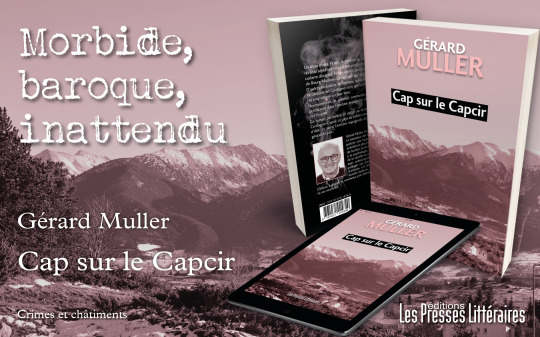
Cap sur le Capcir - Gérard Muller
Un beau matin, Firmin, le gardien du cimetière d’Ur, découvre qu’une récente sépulture vient d’être profanée. Dans le cercueil ouvert gît un cadavre décapité. Firmin avertit aussitôt la brigade de la gendarmerie de Bourg-Madame-Saillagouse qui va se charger de l’enquête.
D’autres violations de tombes, suivant le même procédé, vont alors se dérouler en Cerdagne, sans que le malfaiteur soit identifié, laissant les enquêteurs sur leur faim.
Heureusement, le criminel commettra une erreur qui conduira les gendarmes dans l’enclave espagnole de Llivia où se situe une partie de l’énigme.
Ce roman permettra en outre au lecteur de découvrir la région de Cerdagne-Capcir, ce pays au solide caractère situé au pied du Cambre d’Aze, et aussi l’enclave espagnole de Llivia, avec ses particularités géopolitiques.
Gérard Muller, Académicien des Livres de Toulouse et amoureux des Pyrénées, a trouvé dans le roman policier une façon de décrire des métiers ou des activités en plaçant ses personnages au cœur même de l’action. Là où le roman classique s’intéresse plus à la psychologie, le polar va permettre une étude de la société au plus près des protagonistes et de leurs préoccupations journalières, et en faisant partager ces dernières avec le lecteur. Une sorte d’analyse, à la fois amusante et incisive, de notre monde moderne.
L’auteur a gagné de nombreux prix littéraires pour ses romans, ses polars et ses nouvelles.
n° 167 de la collection :
https://www.lespresseslitteraires.com/crimes-et-châtiments-nouveautés/
ISBN : 979-10-310-1434-0
11,5 X 17, 166 pages, 10,00 €
0 notes
Text
October 26 2022 La Cerdanya

According to Wikipedia:
"Cerdanya ( or often La Cerdanya) is a natural comarca and historical region of the eastern Pyrenees divided between France and Spain. Historically it was one of the counties of Catalonia.
Cerdanya has a land area of 419 sq, divided almost evenly between Spain (50.3%) and France (49.7%). In 2001 its population was approximately 26,500, of whom 53% lived on Spanish territory. Its population density is 24 residents per km² (63 per sq. mile). The only urban area in Cerdanya is the cross-border urban area of Puigcerdà-Bourg-Madame, which contained 10,900 inhabitants in 2001.
The area enjoys a high annual amount of sunshine – around 3,000 hours per year. For this reason, pioneering large-scale solar power projects have been built in several locations in French Cerdagne, including Font-Romeu-Odeillo-Via, the Themis plant near Targassonne, and Mont-Louis Solar Furnace in Mont-Louis."
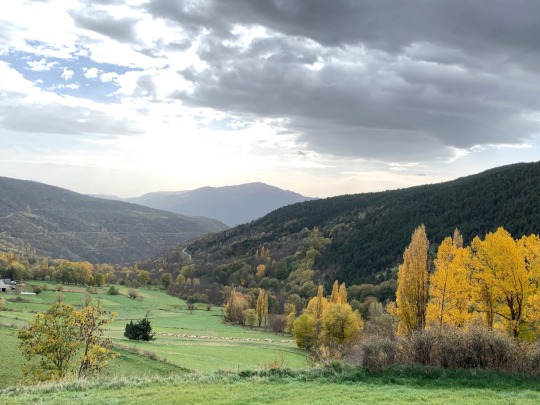
We spent most of our time here yesterday and today in the Spanish part of La Cerdanya but every now and then we crossed into the French part.
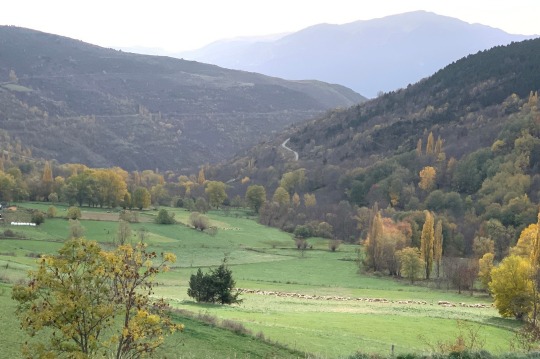
This morning we drove to Isolvol to hike but we were blocked by construction so we ended up touring the lovely little village of Meranges.

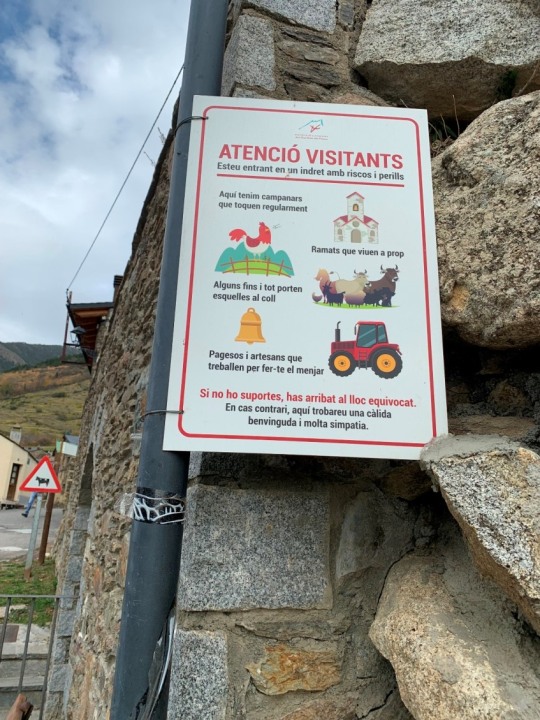
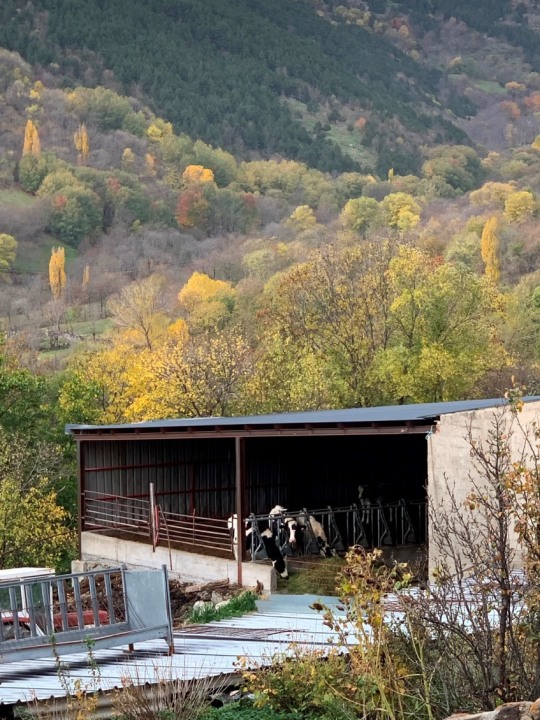

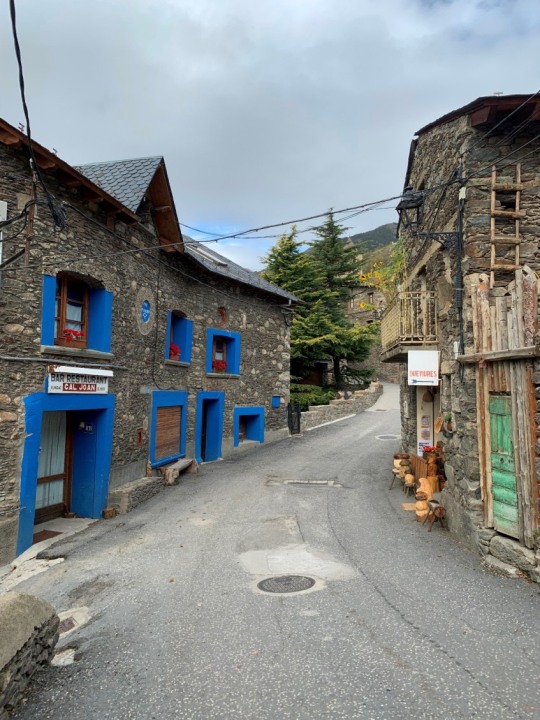
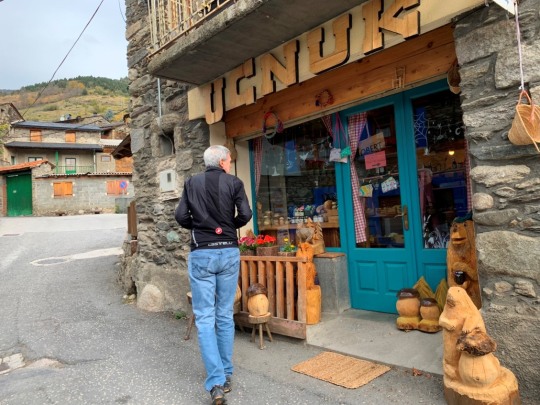

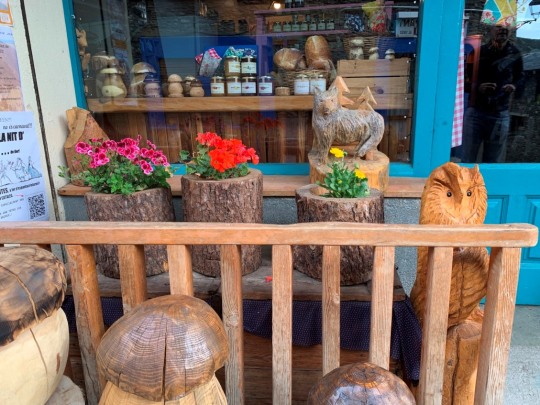

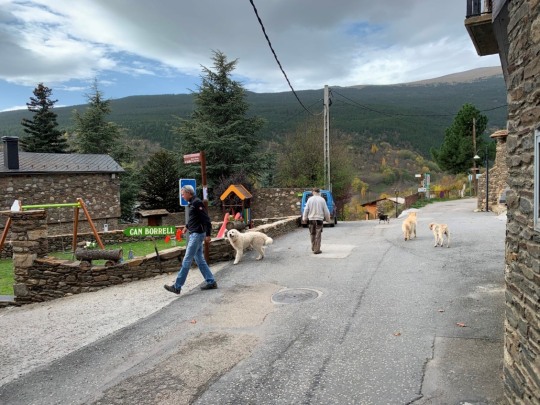
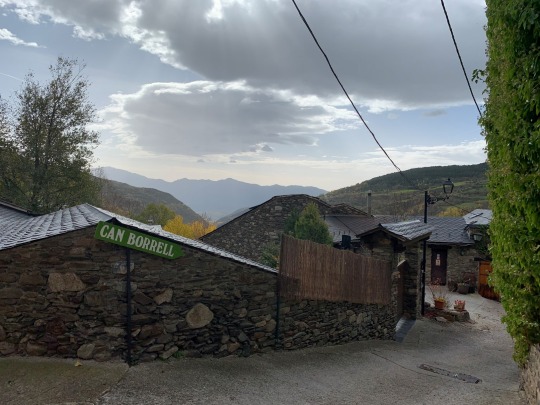


The drive back to Puigcerda was so lovely and the valley shimmered with golden hues in the sun. We were quite hungry by then and we found a cool looking restaurant at the edge of town with views of the valley.

The food was quite good and after lunch and a rest, we felt refreshed. We had read in the guide book about a monastery on the outskirts of the town, so we began to look for it.


What a lovely little city Puigcerda is! We took a few wrong turns and that was wonderful because we saw some things we might have missed if we had stayed on the "straight and narrow." Isn't that a metaphor for Life?
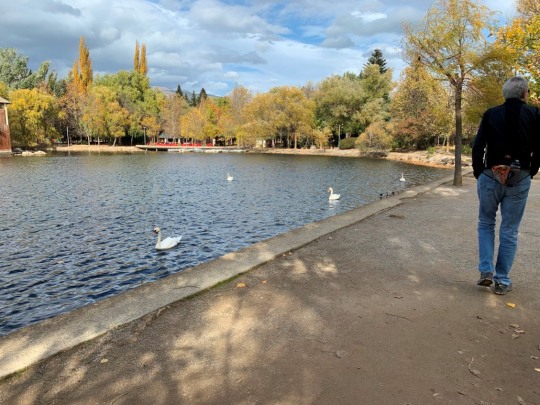
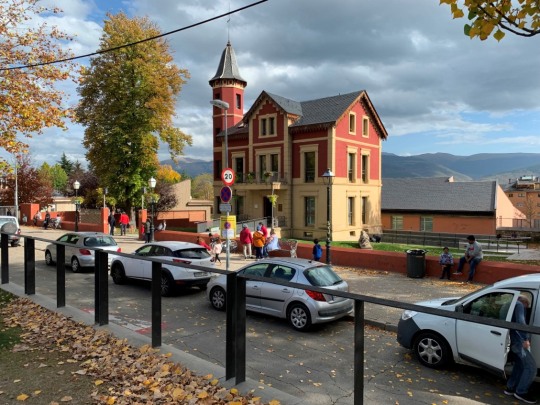
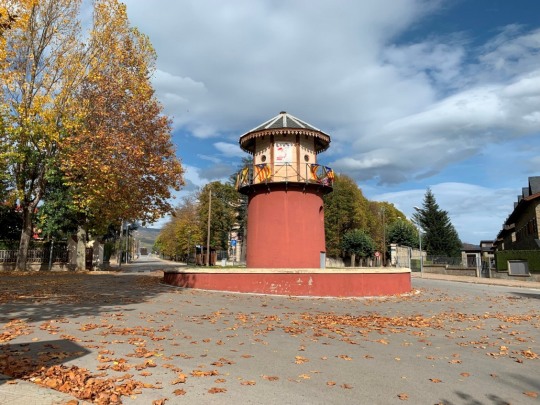

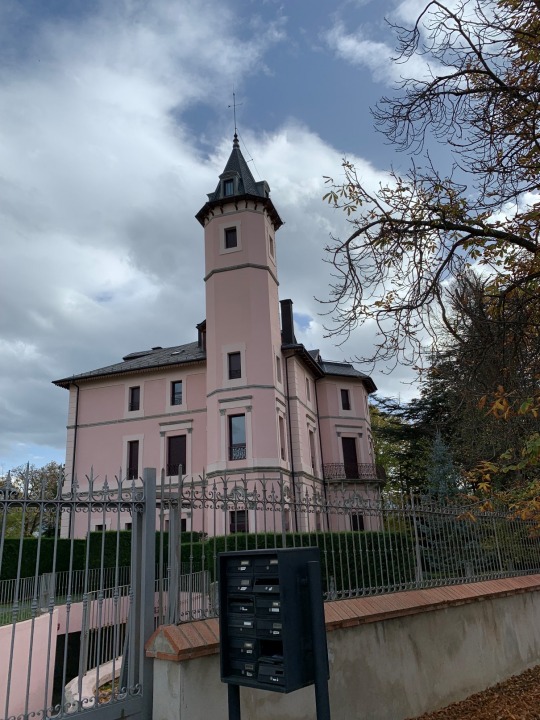
The architecture in this city is unique and unlike what I've seen in other villages in Catalonia. The colors are especially interesting, with lots of pastels, a bit like the colors in southern Spain.


We finally found the monastery and walked into the courtyard. Unfortunately, it wasn't open to the public but it was still worth the walk. All the fields surrounding it are worked by the monks and it seems like a nice place for them to live their contemplative lives.
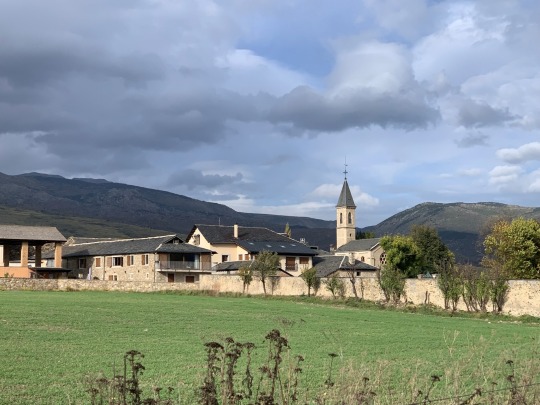



When we got back to the room I looked at my phone and found that Maple's other grandmother, Courtney, had sent me some recent photos of her. She's teething and chewing on everything she can get her hands on! We miss her SO much and it's wonderful of our family to keep us posted on her development. She's SO cute and sweet and changing so fast!
0 notes
Text
The top 13 white wines from France are available in Singapore for less than $50. Each of these wines, from the rich and buttery Chardonnay to the crisp and refreshing Sauvignon Blanc, has a distinct flavour profile that is guaranteed to please any palate. We think everyone should have access to it. We hope that reading this blog has motivated you to learn more about French white wine and discover a new vintage you love. So keep in mind that you don't have to break the budget to indulge in the best French wines the next time you feel like having a glass of wine.
Madame ‘F’ Blanc 2018 – $29.00
Pierrick Harang Le Petit Balthazar CRD – Viognier-Sauvignon Blanc 2021 – $39.00
Pierrick Harang Cuvee Balthazar CRD Viognier 2021 – $42.00
Vini Be Good ‘Les Athletes du Vin’ Touraine Sauvignon Blanc 2014 – $29.00
La Coume-Lumet Limoux Blanc 2018 (Chardonnay-Chenin) – $49.00
La Coume-Lumet ‘Le Maset de Lumet’ Haute Vallee de l’Aude Blanc 2018 (Chenin-Chardonnay) – $35.00
Dom. Tour Saint Michele ‘Cam So’ Cote du Rhone 2014 Blanc – $29.00
Dom. Paul Mas ‘Mas de Tannes Reserve Blanc’ Grenache Blanc 2014 – $36.00
Trois Maisons Blanc Bordeaux 2018 – $39.00
Ch. Ferry Lacombe ‘Hadeus’ Cotes de Provence Blanc 2015 – $35.00
Ch. Gigognan Organic Cotes du Rhone Blanc 2019 – $35.00
Ch. Gros Moulin ‘Lys du Moulin’ Côtes de Bourg Blanc 2019 – $35.00
Foncalieu ‘Cavalier de La Mediterranee’ Chardonnay 2016 – $39.00
1 note
·
View note
Text
Occitania 5. Por la Ruta del “Train Jaune”a Villefranche de Conflent.

Desde Puigcerdá en España, a una media hora andando está la estación de Bourg-Madame. El Tren Amarillo es un tren turístico que va hacia Perpignan. Atraviesa altos valles pirenaicos hasta Villefranche, que es una pequeña ciudad amurallada muy interesante.
Muy cerca de Bourg-Madame, está Ur, una aldea.
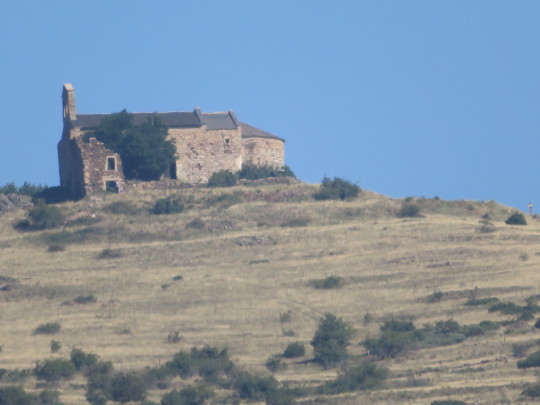















El Destino Villefranche de Conflent, Camino de Santiago, en Francia.
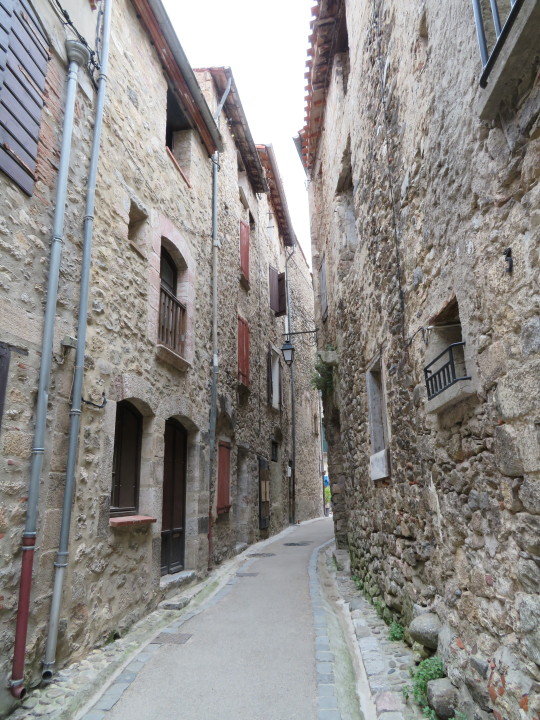
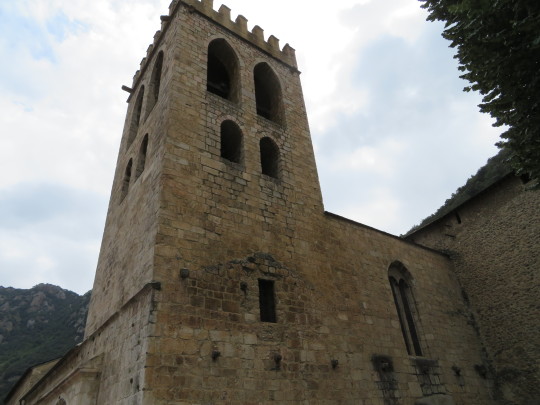
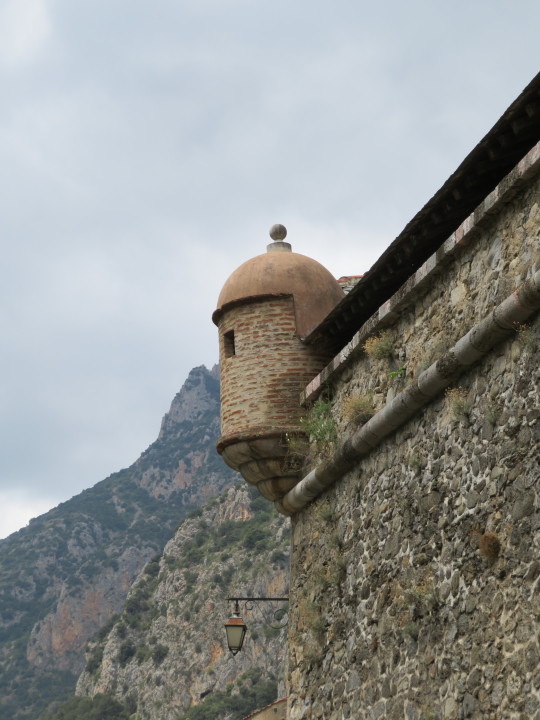
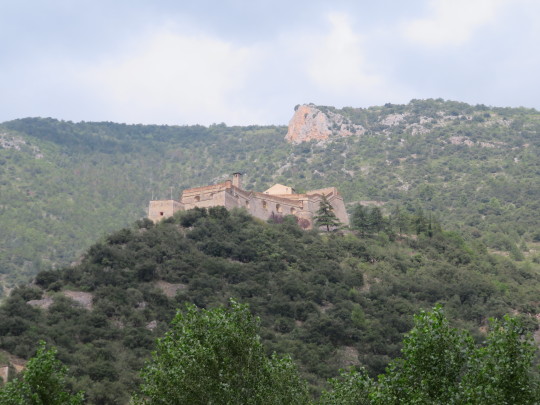

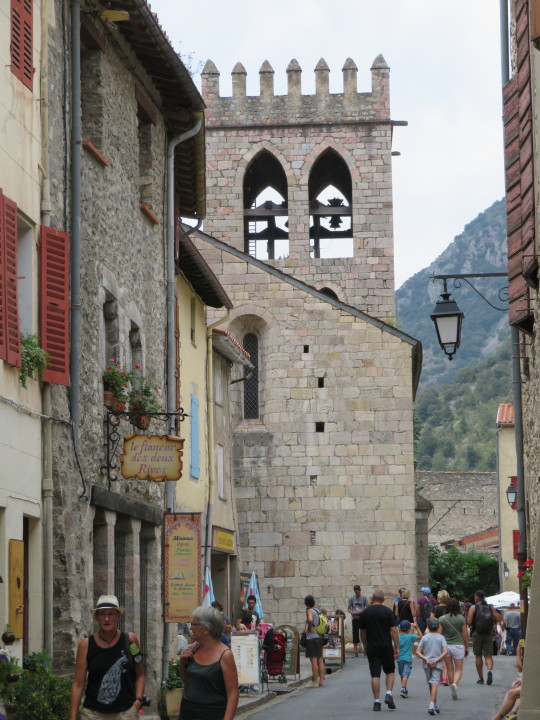


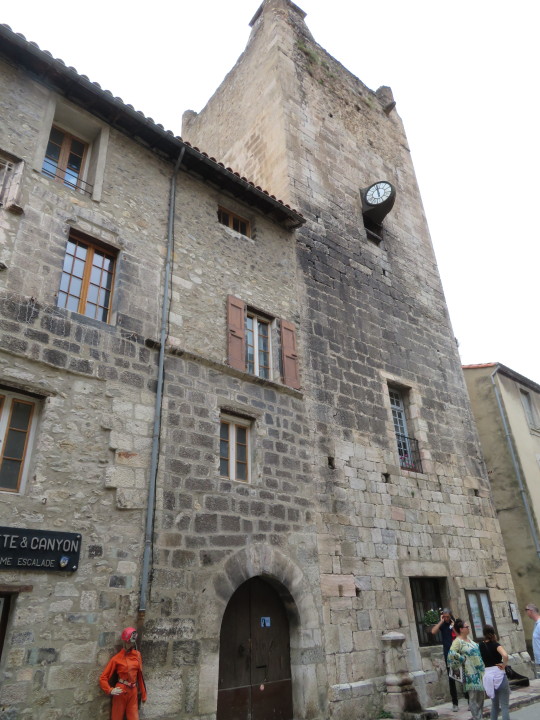

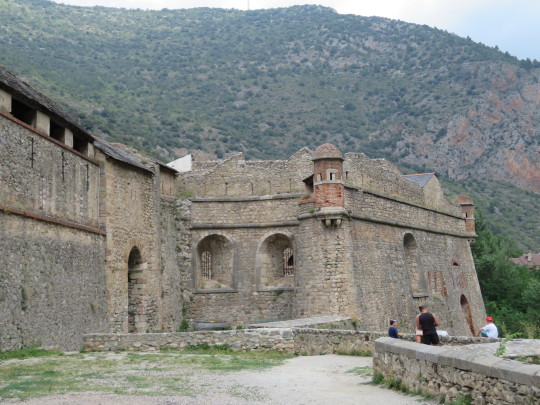
0 notes
Video
youtube
[Lyric Video] U.BAR.E(유발이) - Going to the zoo https://youtu.be/CDbSvm2nhhk Artist : U.BAR.E(유발이) Album Title : Going to the zoo Release Date : 2022.10.26 Genre : 재즈 #JAZZ #유발이 #인디 ■ Mirrorball Music http://mirrorballmusic.co.kr/ https://www.facebook.com/mirrorballmusic https://twitter.com/mirrorballmusic https://www.instagram.com/mirrorballmusic_official/ [ABOUT] 지난해 뮤지션이 최초로 제작한 사운드북 앨범인 [마담꾸꾸 Madame Coucou] 로 많은 사랑을 받은 뮤지션 ‘유발이’가 새��게 내놓는 EP앨범 [마담꾸꾸 Madame Coucou Vol.2]! 프랑스와 한국을 오가며 공연을 하고 음악을 발표했던 싱어송라이터 유발이는 2010년부터 ‘유발이의 소풍’으로 활동하며 독특한 음악세계를 전해왔다. 그러다 훌쩍 프랑스로 유학을 떠나 프랑스의 Conservatoire Bourg La Reine (꽁세바또와 부흐라헨)에서 재즈보컬을 전공하며 공부했고, 유럽 15개국에서 공연을 하며 추억을 쌓았다. 또 프랑스 오디션 프로그램인 [THE VOICE : LA PLUS BELLE VOIX DU MONDE]에 출연하여 무려 월드스타 미카(MIKA)의 지목을 받아 함께 협연하면서 프랑스 현지인들의 큰 사랑을 받으며 화제를 모았다. 프랑스와 인연이 깊은 유발이가 아이들에게 어쿠스틱 고급 프랑스 동요를 들려주고 싶어 [마담꾸꾸 Madame Coucou] 프로젝트를 시작하게 되었다. 우리에게 익숙한 반짝반짝 작은별, 엄지 어디 있니 등의 동요가 원래 프랑스 동요라는 사실에 착안하여 아이와 어른 모두 편하고 즐겁게 들을 수 있는 재즈동요로 재탄생 되었다. 프렌치 재즈 동요 앨범이었던 전작에 이어, 이번 앨범은 영어 재즈 동요로 구성되었다. 앞서 공개된 첫번째 싱글곡 A tisket, a tasket 이후에 발매되는 두번째 싱글 [Going to the zoo]는 온 가족이 다같이 모여 구성원들이 하나씩 단어 소개를 하는 내용의 노래이다. 유발이의 아카펠라로 노래를 시작해 점점 달라지는 가사에 맞게 악기들이 하나씩 들어오면서 점점 빨라지는, 아이들이 특히 좋아할 만한 속도감 있는 곡이다. 유발이가 직접 편곡한 이 곡의 특히 재미있는 점은 곡에 등장하는 여러 명의 다른 캐릭터를 유발이가 혼자 수행하면서 코러스를 포함한 모든 보컬적 역할을 맡아 해냈다는 점이다. 이러한 노력을 통해 아이들뿐만 아니라 어른들이 듣기에도 정말 재미있는, 그리고 음악적으로도 완성도가 높은 곡이 탄생했다. 전작과 마찬가지로 이번 앨범 또한 사운드북으로도 제작될 예정이다. [CREDIT] Nursery Rhyme Arrangement, rewritten lyrics by U.BAR.E Drum, percussions : Lee Kwanghyuck Contrabass : YANG YOUNGHO Acoustic Guitar : Suyu Kim Tenor saxophone : Shin Hyunpill Flute, Accordion : byung ho Kwon Vocal, Piano, chorus, whitle : U.BAR.E Recording at Eum studio, Delight sound studio, Buamhill studio, ggack studio Mixing by Kim Ji Yeop at Delight sound studio Mastering by Byeong Joon Hwang at Soundmirror Korea Album cover artwork Illustration, Music Video Director : Joan Pencil 미러볼 뮤직 - Mirrorball Music
0 notes
Text
At 86, Jacques Pépin Isn’t Slowing Down
At 86, Jacques Pépin Isn’t Slowing Down
Mr. Pépin, who comes from a family of restaurateurs, was 13 when he left his home in Neyron, a small town near Lyon, for a culinary apprenticeship 35 miles away, in Bourg-en-Bresse, where he was born. And he clearly learned his trade well: He was barely in his 20s when, as part of his compulsory military service, he became Charles de Gaulle’s personal chef. (Madame de Gaulle called him “petit…
View On WordPress
#Holiday Rentals#homes for rent#Rent & Relax US#Rentandrelaxus#Short term rentals#vacation homes#Vacation Rentals
0 notes
Text
"« Nous sommes à la recherche de stupéfiants et cigarettes de contrebande. Par ailleurs, nous recherchons des étrangers en situation irrégulière. »
Les fourgonnettes, notamment d'artisans, susceptibles de pouvoir cacher des migrants, ont été particulièrement ciblées. « Certaines entreprises pourraient justement faire appel aux migrants et à cette main-d’œuvre clandestine.
Les exploitants ou leurs ouvriers accompagnent souvent trois ou quatre personnes pour les faire travailler d’une façon illicite », précise le commandant".
(Aussi sur mon Fb, 26/06/19)
Article de L’Indépendant : “Bourg-Madame : les gendarmes et la Guardia Civil ciblent la main-d’œuvre clandestine”
#basile pesso#facts !!!#truth...#france...#espagne...#bourg-madame...#fight drug deal#fight drugs#sud-ouest de la france...#madness#exploitation#journalistes indépendants sur tumblr#contenu original#yes we are magazine
3 notes
·
View notes
Text
Stanislas Fréron hitting on Lucile Desmoulins compilation
”I was very happy there, but one thing troubled me, Fréron. Every day I saw new developments and didn't know what to do about it. I consulted Maman, she approved of my plan to take it lightly and joke about it, which was the wisest course. What else could I do? Forbid him to come? Camille and he had business together every day, we would meet. Telling him to be more cautious would be to admit that I knew everything and didn't disapprove; it would have required an explanation. I thought myself very prudent then to receive him with friendly reserve as usual and I see now that I was right. Soon he left on mission. I was very glad, I thought things would change. […] Fréron has returned. He appears to still be the same, but I don't care, let him go crazy if he wants.”
Lucile in her diary December 12 1792
”I beg Madame Desmoulins to be pleased to accept the homage of my respect. I have the honour to inform her that my destination is changed, that I shall not go to the National Assembly because I am setting out for the country with MM Danton and Saturne. Will she have the goodness to present herself at the assembly, before ten o’clock, in the hall of deputations; that she is to send for M. La Source, the secretary, who will come to her, and she will find a place for her by means of the commissary of the tribunes. I renew the assurence of my respectful devotion to Madame Desmoulins.”
Fréron to Lucile January 7 1793
I beg the chaste Diana to accept the homage of a quarter of a deer killed in her domains. Adieu. Stanislas Lapin.
Fréron to Lucile January 21 1793. In her diary entry from the same day, Lucile simply remarks ”F sent us deer.”
Fréron came. He always seems to sigh but how bearish are these manners! Poor devil. What hope do you hold? Extinguish in your heart a senseless …r! (sic) What can I do for you? I pity you... No, no, my friend, my dear Camille. Never will this friendship, this love so pure, exist for anyone else but you, and those I see will only be dear to me through the friendship they have for you.
Lucile in her diary January 22 1793
”You know since long that I love your wife madly, I write to her about it, it's the least consolation that can be produced for an unhappy rabbit, absent since eight months. […] Goodbye, think sometimes of the best of your friends both of you, answer me, as well as Rouleau.
Fréron to Camille October 18 1793
”The communications between the southern departments and Paris have been closed for more than three months. Since they’ve been re-established, I’ve wanted to write to you. A hundred times I’ve taken up my quill, and a hundred times it’s fallen from my hand. May this letter convince you, Lucile, that you have always been in my thoughts! Let Camille murmur, let him say whatever he likes about it, he’ll just be acting like any proprietor; but surely he can’t insult you by thinking he’s the only one in the world who finds you loveable and has the right to tell you so. He knows it, that wretch of Bouli-Boula, because he said in your presence "I love Rabbit because he loves Lucile.” This poor rabbit has had a great deal of adventures. […] He has often missed the thyme and the serpolet that your lovely hands enjoyed taking care of in your garden at Bourg de l’Égalité[…] Do you know what sustained him, what he always had before his eyes? First, the patrie, then you. He did not and does not want anything but to be worthy of you two… You will find this romantic rabbit and he is not bad at it. He remembers your idylls, your willows, your gravestones and your bursts of laughter. He sees you trotting about your room, running across the floor, seated one moment at your piano, hours together in your armchair dreaming, letting your imagination wander; then he sees you making coffee, slaving away and swearing like a cat, showing your teeth. He enters your bedroom; he stealthily casts a longing eye on a certain blue bed, he watches you, he listens to you, and he keeps quiet. Isn't that you! Isn't that me! When will these happy moments return? I don’t know, I’m here to hurry by any means the destruction of that execrable Toulon. I’m determined either to die on its ramparts or to scale them, torch in hand. Death will be sweet and glorious, provided you can spare a tear for me. [...] I embrace you, devine Rouleau, more dear than all rouleax made of gold and crowns that one can offer me. I embrace you in hope, and I will only date my happiness from the day I next see you. Remember me to your dear maman and Citizen Duplessis. Will you answer me? "Oh! no, Stanislas." […] Show my letter to Camille, because I don’t want to make a mystery of anything.
Fréron to Lucile October 18 1793
”The day before yesterday I received, read, re-read, and devoured your letter, and the quill doesn’t fall from my hand in acknowledging receipt. How happy it made me!… More happiness than I dared to hope. Think then, of this poor rabbit who, exiled far from your heather, your cabbage, your thyme and my fathers house, is consumed by sorrow in seeing the most constant efforts for the glory and strengthening of the republic lost. […] Don’t come here, lovable and dear Lucile, it’s a frightful land, whatever they say, a barbaric land, when you have lived in Paris. I have no caverne to offer you, but a lot of cypress. It grows here naturally. Tell your glutton of a husband that the snipes and thrushes here are better than the habitants. if it weren't so far from here in Paris, I would send him some, but you will receive some olives and oil. […] Goodbye once more, mad-woman, a hundred times mad, beloved Rouleau, bouli-boula of my heart; here is a long letter but I gave myself over to the pleasure of chatting with you and took the night for it. Tell then your loup-loup to write to me, he’s a lazy one. When it comes to your reply to this letter, it will probably take a year to arrive. What does it matter to me? On the contrary. It’s clear as day. I remember these inintelligibles phrases, I remember this piano, these head tunes, and your melancholy, abruptly interupted by big bursts of laugther. Indefinable being!…Farewell. I embrace the whole warren and you, Lucile, with tenderness and all my soul.
Fréron to Lucile December 11 1793
You haven't answered me, dearest Lucile, and my accuracy has stunned you so much that your astonishment still lasts. You had postponed my answer to eight months, you see if you are a good prophetess. […] Answer me then, lazy girl that you are, and ingrate which is worse. One breaks silence after a year, after centuries, and one gets by grace a few words written in distraction. Bouli-Boula, what does it mean to me? The rabbit is desolate; he thinks of you without end; he thought of you in the midst of bombs and bullets, and he would have gladly said like that old gallant: Ah! if my lady saw me! […] Goodbye, Lucile, evil devil. Has your thyme been harvested? I can't wait, despite all my offenses, to beg the favor of nibbling it from your hand. […] You'll have neither olives nor oil if I don't get a response from you. You can tell me whatever you like but I love you and embrace you, right under the nose of your jealous Loup-loup. Goodbye once more. […] Goodbye again, loveliest of rouleux. My respects to your good and beautiful mother.
Fréron to Lucile January 5 1794
Feel free to tell me if there’s any translator fails in here, it’s sometimes pretty hard for me to make out what that creep actually means.
#wtf stanislaus#A she’s married B she obviously doesn’t want you#hands up who’s happy they’re not a woman in the 18th century#lucile desmoulins#camille desmoulins#desmoulins#stanislaus fréron#frev#frev compilation
42 notes
·
View notes
Text
Wednesday 2 July 1834
5
12
no kiss see last night - very fine morning - F70° at 6 10 - A- and I out at 6 40 sauntered along the rue de Rhone § [to the Toporama to see Godots’ fine model of Switzerland – not the one I saw in 1827 – only ½ the size but containing more extract of country i.e. the Tyrol, Italian lakes, part of the Piemont and the whole Switzerland – on sale – for not less than 24000fr. French – would see the other (the large and old one) for 900fr. - a model in hand like the 24000fr. one, reduced from about 15 by 9ft. French to about 3ft. by 2 ½ ft. French at 500fr. to be sent to Sweden to Baron Müller – had made several on this scale and sent them to England - to Lord Grey – Lord Monson et aliis - made one of the Mont Blanc mountains only, on a very large scale for the Ecole des mines à Paris – said I should like a scale between the big and the little and he agreed to make me (in 6 months and send via Paris and Calais to London there to be paid on its arrival) a model taking in all the country – all the étendre of the large at 24000fr. for 15000fr. – said I should be back again from Chamouni [Chamonix-Mont-Blanc] soon and would let him know about it - Miss W- shockingly tired of standing so long – about an hour there – put in the post en passant my letter to my aunt ‘Shibden Hall Halifax Yorkshire Angleterre’ and A-‘s letter to her aunt Cliff hill and sister and Washington – vid. yesterday - home at 8 ¾ - breakfast at 9 to 10 ¾ - having George up 2 or 3 times to give him instructions in French
§ went into the rue de la cité and paid for plan of Geneva that came at 6 ½ this morning etc and staid there sometime – the man very civil gave me 4 addresses for pensions (thought of leaving Eugenie at one) and gave me the relative value of Geneva money compared with French
sols de Geneva Francs cents
pieces of
½ = 0.2
1 = 0.4
3 = 0.12
1 5= 0.58
21 = 0.80
1 florin de Geneva = 12 sols de Geneva
26 sols de Geneva = 1 Franc de France
1 Ecu de 5fr. (French) vaut florin 10.10s
2fr. ---------------------------------------- 4.4.
1fr. -----------------------------------------2.2
1/2fr.----------------------------------------1.1
then chez Joan Soupat, place du bourg du four, for little silk shawl for A- had not one, but good shop for Swiss Muslins and linen etc - they sent us to Louis Pernin fils au bas de la cité no. 51 and got a ficher - home at 8 ¾ - breakfast etc (the 12 lines with in brackets belong to after breakfast) - from 11 ¾ to 1 ¾ when A- and I out again – had had a porter after breakfast – said there were 240 rooms in the house of which 160 de maitre - 34 chambres de maitre sur chaque des 5 étages - price of a country house for the season (6 months 3,000 to 4,000fr. - Coligny) that Lord Byron had 4,000 fr. -Had inquired at the police – Miss Pickford had not been here of 3 years - A- had lain down – had ordered a carriage at 2 – she and I out in it at 2 ¾ and took Eugenie with us – went to the bank (H. Hentsch and co.) on the quai almost opposite to our hotel des Bergues - from £25 circular no. 4096, received 11 double napoleons + 9 singular ditto = 620fr. for which paid (agio on the gold) 7/50? and for gold now cost 15 fr. per thousand and this not considered dear - a month hence would be 20/ agio per thousand - forgot to ask for an account of what I received - supposed I paid 7/55 agio this would make 620+7/55+(5sols de Genève taken at sols French) ./20 = 627fr. 75 cents = exchange at 25fr. 11 cents- from the bank to the Grand Chemin des Philosophes, chez Madame Bacle for pension for Eugenie - would take her (giving her 2 ground floors rooms) for 175fr. per month so that we could sleep a night or 2 there if we liked - but for our own living to pay 10fr. a day - happening to inquire about Miss Pickford found she and Miss Maitland were chez Madame Palis – a house or two distant – went there – waited 20 minutes till 4 5 then sat with them till 4 ½ - Miss P- said nothing but seemed surprised – was she not nervous? looked well - told her of her letter record in Paris last July - they are going to England on Tuesday - Paris via Dijon by voiturin, the one from here they have had at Naples, and everywhere - Miss Maitland a very tall, large woman – asked me to stay and dine with them at their public table! – Miss P- said nothing – she probably knew me better – declined very civilly on account of much to do and going to Chamouni [Chamonix-Mont-Blanc] tomorrow - Miss P- hardly seemed at ease - true she lost much (‘pretty well’) by Miss Threlfall who died 2 years ago - might have recovered it, but it would cost more than it was worth - the musé [musée] under repair could not be seen perhaps may be a fortnight hence - 20 minutes in the botanic garden goes up to Mr. Eynards’ nice house and gardens - the garden arranged on the natural system - very ill kept - the Serres full of workmen - then to the cathedral - full of workmen preparing for the Grand Helvetic concert on the 28th inst. - neat, clean, handsome gothic pile - du temps de Charlemagne the woman said - 3 fine painted glass windows in the apsis - Charlemagne, in that on the right - home at 5 ½ - dinner at 5 40 - had just the loueur of the carriage - called the distance to Sallenche [Sallanches] 15 lieues (instead of 12 or in truth 11) and asked 48/. - tho’ he had agreed with the porter for 36/. - said people gave the cocher 3/. a day - 30/. + 4/. for cocher would have been enough the porter owned had it been last year - now forage dear and 36/. fair - offered to get me another carriage - no! said I would go en poste - poste arranged as in France 36 sols per cheval and 1 extra cheval not put on for us at 20 sols - so I shall leave the carriage at Sallenche [Sallanches] and Eugenie too - sat long over dinner and dessert – dawdling talking – from 10 ¼ to 11 20 wrote the above of today – fine day till lowering at 5 ½ and between 6 and 7 (and long afterwards flashes of lighting at intervals much thunder) heavy rain and a thunder storm – lightning very vivid and much thunder 1 peal so near the house seemed coming down - F72 ½° now at 11 20 pm - Miss W- owns she has had whites again (had them years ago and since) these last two or three days burn her in making water said she had rather affected me on Monday night
3 notes
·
View notes